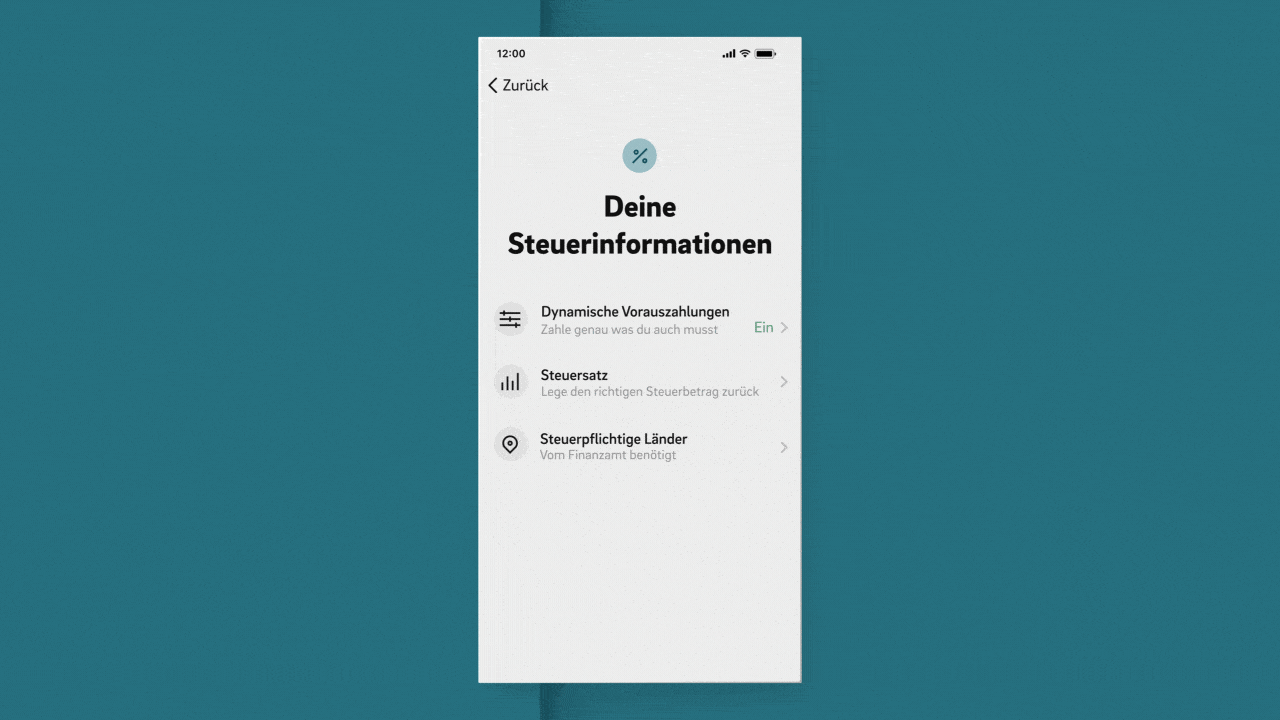Next Level Banking for the self-employed
Last updated on Jun 6, 2023
Melchior Neumann
Kontist Tax Advisory
Jan 15, 2020
Our mission since day 1 has been to simplify the financial management of the self-employed. We want self-employment to be as easy as being an employee. If we're honest, that's a long way to go and there are many bureaucratic and financial challenges to overcome. German tax law in particular is a jungle in which it is almost impossible to survive without help as a self-employed person.
Finances of employees and the self-employed
Let's just compare an employee with a salary of 5,000 euros a month and a self-employed person with a profit of 5,000 euros per month. The employee does his job, receives a pay slip at the end of the month and receives his salary. With tax class 1, that's around 2,900 euros. He can spend this money completely and does not have to worry about taxes and (social) insurance. He doesn't even have to file a tax return. As soon as he gets the salary he is safe and can live his life completely carefree.
The self-employed works the whole month (not infrequently more than 40 hours / week) and after paying all the bills has an increase of 5,000 euros. Financially it is the same for her. But she not only has the 5,000 euros in her account, she also has the sales tax of around 1,000 euros on top in her account. Of the 6,000 euros, she then has to make the advance sales tax declaration herself, cover income tax and trade tax, has to take care of his health insurance, provide for old age and build up a reserve for times when there is no order. So she has 6,000 euros in her account, but she only owns about 2,900 euros. The rest belongs to different authorities, such as the tax office or health insurance.
Self-employed people have a lot of work to do to find out how much they have actually earned. Self-employment is not as permanent as being an employee and it may well be that you have a net income of 2,900 euros in one month, but only 800 euros in the next month and 5,500 euros in the month thereafter. The tax rate and the proportion that should be set aside for tax are constantly changing.
Financial and legal uncertainty for the self-employed
But the real disadvantage is permanent uncertainty. Even if the order situation is perfect, it is not the case that the self-employed can live as carefree as employees. You have to make a regular advance tax return, pay quarterly income tax and trade tax and submit several tax returns once a year (sales tax, income tax and trade tax). Then there is an additional payment or a refund.
And even then you are still not sure. The tax office can knock on the door up to 10 years later and carry out an audit. The invoice that you write and pay tax today can still be checked and questioned in 8 years. That would be unthinkable for employees.

Kontist - your financial cockpit with real-time tax calculation
For this reason we have developed Kontist. Kontist shows you in real time how much money you actually own and how much you owe the tax office. With Kontist you know that, for example, you can only spend € 2,900 of your € 6,000 because you still have to pay € 1,000 sales tax and € 2,100 income tax. With each incoming and outgoing account transaction, the amount is updated and you have an overview of your finances at every second.
When you do your bookkeeping with one of our partners, such as Lexoffice, Kontist instantly detects incoming transactions and automatically categorizes them. This functionality is unique on the market. As a result, many thousands of self-employed people have a better overview of their finances and we are continuously working on improving and protecting you from bad tax surprises.
So we have released some updates in the past weeks and months that make your life easier. For example, your tax rate now refers to separate years and you can adjust your tax rate on an annual basis. We have also been offering the MT940 format for some time, which helps your tax advisor to process the data in DATEV.
And now we're taking the next step ...
Don't talk, do it!
With our new feature, we go one step further: So far, Kontist has shown you how much money you should save for tax and so you had a better overview. But did you also know that you can write to the tax office to adjust your advance payments to the current tax estimates?
If you earn more than the tax office estimated, an ever increasing amount will accumulate in your tax reserves and you run the risk of getting a really high tax back payment. If you do not make your tax return immediately after the turn of the year in such a situation, this additional payment can increase even more with subsequent advance payments.
Another situation: the tax office has overestimated your income and you earn less than expected. Now you have to pay a large sum to the tax office every quarter and every time you ask yourself how you should raise this amount. After all, you earn much less.
In both cases, you can write to the tax office and ask for the advance payments to be adjusted. Thanks to Kontist you also know how high your true tax burden is approximately.
And from now on you can also make these adjustments directly in your Kontist app!
We keep an eye on your actual advance payments and continuously compare them with the estimated tax amounts. And if we notice that you are either paying too much or too little tax in advance, we will remind you and you can adjust the tax payments with just a few clicks.
This function is unique in the world and even many tax consultants fail to inform their clients in good time that they can adjust the advance payments. Mostly because they do not have up-to-date data at all to create tax calculations.

Next steps
Our mission remains: The financial management of the self-employed should be as simple as that of the employees. This feature has brought us a step closer and we look forward to your feedback.
But we will not stop and are already working on the next functions. For example, we want to further expand the automatic categorization, ensure a dynamic tax rate that automatically adapts to your income, we want to regularly remind you of upcoming tax payments and, for example, develop integrations with tax software so that you can create your income surplus calculation just as easily can do your bookkeeping with lexoffice and Kontist.
Stay tuned, sit back, let Kontist adjust your tax prepayments, and keep an eye out for the next features.
Related articles
Freelancers - What Hourly Rate Should You Charge?
There are a lot of assumptions about Freelancers and self-employed people. Some are true - yes the freedom to make the schedule and ‘’choose’’ your clients is great. However, unlike a standard 9 to 5 job where your role is clear and defined, where the organisation you work for scales your salary and aligns it closely with specific experience and also - provides a pathway to earn more, freelancers are left to structure their income themselves as well. The assumption is - this is great, you can really charge what you are worth! However, clients tend to assume freelancers have a ‘’discounted rate’’ or that their direct rate entitles them to harsh negotiations. Quite simply, this is not the case. For freelancers, in this case, it is very important to know how much you should charge, and why - so you can negotiate your worth. In this article, we are going to take a look at what hourly rate you should be charging.
Kate Bailey
Freelance Editor
